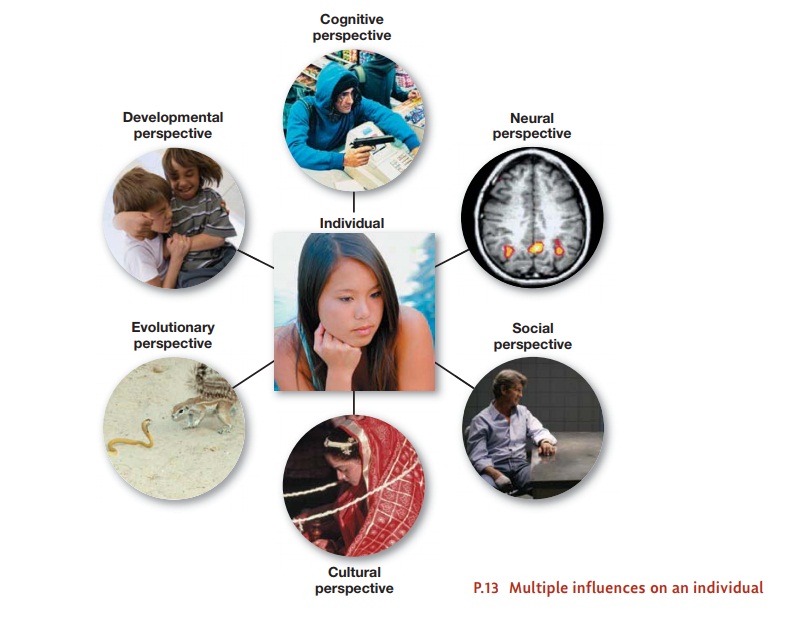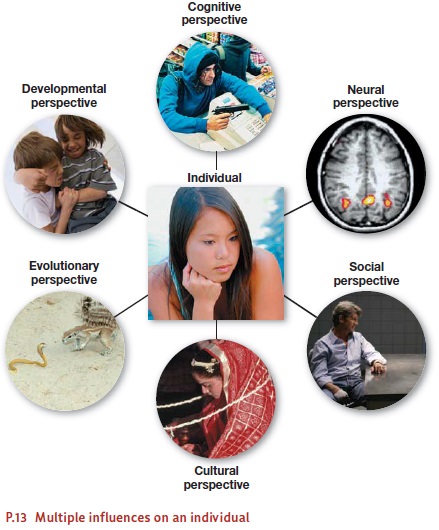Chapter: Psychology: Prologue: What Is Psychology?
What Unites Psychology?

WHAT UNITES PSYCHOLOGY
?
It’s clear, then, that if we are
going to understand emotional memories—including why they are so vivid, why
they are sometimes inaccurate, why they can sometimes contribute to PTSD—we
need to study these memories from many perspectives and rely on many different
methods. And what holds true for these memories also holds true for most other
psychological phenomena. They too must be viewed from many perspectives because
each perspective is valid, and none is complete without the others.
With all this emphasis on
psychology’s diversity, though, both in the field’s content and in its
perspectives, what holds our field together? What gives the field its
coher-ence? The answer has two parts: a set of shared themes, and a commitment
to scientific methods.
A Shared Set of Thematic Concerns
As we have seen, psychologists
ask questions that require broad and complex answers. But, over and over, a
small number of themes emerge within these answers. These themes essentially
create a portrait of our science and are a central part of the answer to the
broad question “What has psychology learned?” These themes also highlight key
aspects of psychology’s subject matter
by highlighting crucial points about how the mind works and why we behave as we
do.
MULTIPLEP ERSPECTIVES
One of these recurrent themes has
already entered our discussion—namely, that the phenomena of interest to
psychology are influenced by many factors (Figure P.13). As we have seen, this
interaction among multiple factors forces the field to draw on a vari-ety of
perspectives, methods, and types of analysis. But, along with this
methodological point, there’s an important lesson here about the nature of the
mind, and the nature of behavior: We are complex organisms, sensitive to many
different cues and influences, and any theory that ignores this complexity will
inevitably be incomplete. This is, by the way, why the modern field of
psychology has largely stepped away from the all-inclusive

frameworks that once defined our
field—such as the framework proposed by Sigmund Freud, or the one proposed by
B. F. Skinner. The problem is not that these frameworks are wrong; indeed,
these scholars made enormous contributions to the field. The problem instead is
that each of these frameworks captures only part of the puzzle, and so our
explanations will ulti-mately need to draw on multiple types of explanation.
THE LIMITED VALUE OF DICHOTOMIES
Another theme is related to the
first: It concerns the interplay between our biologi-cal heritage, on the one
side, and the influence of our experiences, on the other. It’s sometimes easy
to think of these influences as separate. We might ask, for example, whether a
particular behavior is “innate” or “learned,” whether it is rooted in “nature”
or “nurture.” Similarly, it’s easy to ask whether a particular action arises
from inside the organism or is elicited by the environment; whether your
roommate acted the way she did yesterday because of her personality or because
of aspects of the situation. As our discussion of emotional memories has
indicated, though, these “either-or ” dichotomies often pose the issue in the
wrong way, as though we had to choose just one answer and dismiss the other.
The reality instead is that we need to consider nature and nurture, factors inside and
outside the organism. And—above all—we need to consider how these various
influences interact. Emotional memories, for example, are influenced by a rich
interaction between factors inside the organism (like our genetic heritage, or
the functioning of the amygdala, or the individual’s personality or prior
beliefs) and factors in the situa-tion (like cultural expectations, or
situational pressures). The same is true for most other behaviors as well.
WE ARE ACTIVE PERCEIVERS
A third theme has also already
come up in our discussion: We do not passively absorb our experience, simply
recording the sights and sounds we encounter. We have mentioned that our
memories integrate new experiences with prior knowledge, and that we seem to
“interpret as we go” in our daily lives and then store in memory the product of
this inter-pretation. These ideas, too, will emerge again and again in our
discussion, as we consider the active nature of the organism in selecting,
interpreting, and organizing experience.
THEI NEVITABILITY OF TRADE - OFFS
A fourth theme is related to the
third: Our activities, in interpreting our experience, both help us and hurt
us. They help by bringing us to a richer, deeper, better organized sense of our
experience, thus allowing us to make better use of that experience. But these
same activities can hurt us by leading to inaccuracy—if our interpretation is
off, or if our selection leads us to overlook or forget bits of the expe-rience
that we may need later. A similar kind of trade-off was relevant to our
discus-sion of PTSD: The biological mechanisms that promote emotional memory
ensure that we will remember the important events of our lives. But these same
mechanisms can burden us with memories that are more vivid and longer-lasting
than we might sometimes wish. Trade-offs like these, in which generally useful
mechanisms some-times have undesirable consequences, are evident throughout the
study of psychology. In other words, we’ll see over and over that some of the
undesirable aspects of our perception, memory, emotions, and behavior may just
be the price we pay for mechanisms that, in a wide range of circumstances,
serve us very well.
Broad themes like these bring a
powerful coherence to the field of psychology, despite its diversity of
coverage and methods. As we’ll see, there are important consistencies in how we
behave and why we do what we do, and these consistencies provide linkages among
the various areas of psychology.
A Commitment to Scientific Methods
Along with this set of thematic
concerns, another factor also unifies our field: a com-mitment to a scientific psychology. To understand the
importance of this point, let’s bear in mind that the questions occupying
psychologists today have fascinated people for thousands of years. Novelists
and poets have plumbed the nature of human action in countless settings.
Playwrights have pondered romantic liaisons or the relationship between
generations. The ancient Greeks commented extensively on the proper way to rear
children, and philosophers, social activists, and many others have offered
their counsel regarding how we should live—how we should eliminate violence,
treat mental illness, and so forth.
Against this backdrop, what is
distinctive about psychology’s contribution to these issues? A large part of
the answer is that psychologists, no matter what their perspec-tive, work
within the broad framework of science—by formulating specific hypotheses that
are open to definitive testing and then taking the steps to test these
hypotheses. In this fashion, we can determine which proposals are well founded
and which are not, which bits of counsel are warranted and which are ill
advised. Then, when we are rea-sonably certain about which hypotheses are
correct, we can build from there—knowing that we are building on a firm base.
Scientific research methods have
served psychology well. We know a great deal about emotional memories, and why
we sometimes forget things, and how children develop, and why some people
suffer from schizophrenia, and much more. But what is the sci-entific method,
and how is it used within psychology? By exploring these methodological points,
we’ll see how psychologists develop their claims. We’ll also learn why these
claims must be taken seriously and how they can be used as a basis for
developing applications and procedures that can, in truth, make our world a
better place.
Related Topics